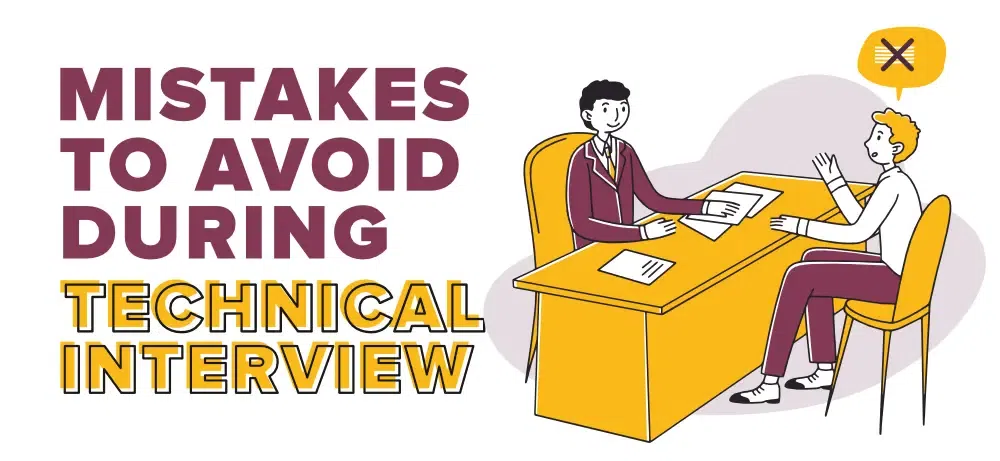Look, nailing a software engineer interview isn’t a walk in the park. You’ve got to bring your A-game to show off those coding chops and prove you know your stuff. But here’s the thing: even super smart engineers can trip themselves up during interviews. I’ve seen it happen more times than I can count.
Software engineer interviews are notoriously challenging, but they are also an exciting opportunity to showcase your skills and land your dream job in tech. Navigating the complexities of these interviews requires a blend of technical prowess and strategic preparation. This guide will help you understand the common pitfalls and how to avoid them, ensuring you make a stellar impression from the moment you walk in (or log in) to your interview.
Whether you’re a seasoned pro or a fresh graduate, the pressure of an interview can make even the best of us falter. But don’t worry – by learning from the mistakes of others, you can avoid common traps and present yourself as the perfect candidate. Let’s explore some of the most frequent missteps and how to sidestep them effectively.
So, let’s talk about some of the biggest blunders people make in these interviews. Trust me, I’ve made a few of these myself back in the day. But more importantly, I’m going to give you the inside scoop on how to avoid them. By the time we’re done here, you’ll be ready to walk into that interview room (or jump on that video call) with confidence. Let’s dive in, shall we?
A software engineer interview is a critical step in securing a job in the tech industry. As a software engineer, you will be expected to demonstrate a high level of technical skill and knowledge. However, many candidates make the same mistakes during their interviews, which can negatively impact their chances of getting hired. In this article, we will explore some of the most common mistakes made during software engineer interviews and provide tips on how to avoid them.
Lack of Preparation
Overview
One of the most common mistakes made during software engineer interviews is a lack of preparation. Candidates may not take the time to research the company, the position they are applying for, or the specific skills required for the job. This can lead to a lack of understanding of the company’s culture, product, or services. It can also result in a poor understanding of the role and the specific skills required, which will make it difficult to answer questions related to the job during the interview.
Solution
To avoid this mistake, candidates should take the time to research the company, the position they are applying for, and the specific skills required for the job. This can be done by visiting the company’s website, reading news articles about the company, and talking to current or former employees. Candidates should also review the job description and requirements and prepare answers to questions related to the role and the specific skills required. Additionally, candidates should prepare examples of their relevant experience and how it aligns with the job requirements.
Think of your preparation as an investment. The more you know about the company and the role, the more confident and competent you will appear. Companies appreciate candidates who show a genuine interest in their mission and values. So, go beyond just browsing the website – delve into the company’s latest projects, read up on their industry position, and think about how you can contribute to their goals.
Inadequate Technical Knowledge
Overview
Another common mistake made during software engineer interviews is an inadequate level of technical knowledge. Candidates may not have a good understanding of the specific technologies or programming languages required for the job or may not be able to explain complex technical concepts in a clear and concise manner. This can lead to difficulty answering technical questions during the interview, which can make it difficult to demonstrate the necessary skills and qualifications for the job.
Solution
To avoid this mistake, candidates should familiarize themselves with the specific technologies and programming languages required for the job. This can be done by reading documentation, watching tutorials, or attending training courses. Candidates should also practice explaining complex technical concepts in a clear and concise manner and be prepared to answer technical questions during the interview. Additionally, candidates should be able to demonstrate their understanding of the technology by providing examples of their relevant experience and how they have used the technology in past projects or work experiences. It’s also a good idea to review and practice coding challenges or algorithms that are commonly asked in interviews.
In addition to brushing up on specific technologies, consider contributing to open-source projects or building a small personal project that demonstrates your skills. These real-world applications of your knowledge can serve as tangible proof of your capabilities and provide great talking points during your interview.
Look, it’s not all about the tech stuff. A lot of candidates obsess over coding challenges and algorithms but completely forget about the human side of things. Big mistake. Companies want to know if you can play nice with others and handle the day-to-day grind of being a software engineer.
Companies are not just hiring a set of technical skills – they are bringing a new member into their team. Your ability to collaborate, adapt, and communicate effectively is just as crucial as your coding abilities. Show that you can balance the technical and human aspects of the job by preparing for behavioral questions and demonstrating emotional intelligence during your interview.
Here’s the deal: You need to be ready for questions about teamwork, conflict resolution, and how you handle pressure. Think about times when you’ve had to put out fires at work or deal with a difficult coworker. Have those stories locked and loaded. And remember, they’re not looking for perfection – they want to see that you can learn from your mistakes and grow.
Overlooking Behavioral Questions
Overview
Many candidates focus solely on technical questions and overlook the importance of behavioral questions during the software engineer interview. Behavioral questions are designed to assess how candidates handle various work situations, their problem-solving abilities, and their interpersonal skills. Neglecting this aspect can hinder a candidate’s ability to showcase their well-rounded capabilities.
Solution
To address this, candidates should prepare for common behavioral questions by reflecting on their past experiences and identifying key examples that highlight their skills and achievements. Practicing answers to questions like, “Tell me about a time when you faced a significant challenge,” or “How do you prioritize tasks under tight deadlines?” can help candidates articulate their experiences confidently. Demonstrating strong interpersonal and problem-solving skills can significantly boost a candidate’s overall impression during the interview.
Inability to Communicate
Overview
Another common mistake made during software engineer interviews is an inability to communicate effectively. Candidates may struggle to explain their thought process, approach to problem-solving, or experience in a clear and concise manner. This can lead to difficulty communicating their qualifications for the job, which can make it difficult to demonstrate their value as a candidate.
Solution
To avoid this mistake, candidates should practice communicating their thought process, approach to problem-solving, and experience in a clear and concise manner. This can be done by preparing examples of their relevant experience and how it aligns with the job requirements. Candidates should also practice explaining their thought process and approach to problem-solving during a mock interview with a friend or mentor. Additionally, candidates should be able to clearly explain their experience with relevant technologies and programming languages and be able to provide examples of how they have used them in past projects.

Unprofessionalism
Overview
Another common mistake made during software engineer interviews is unprofessionalism. This can include being late for the interview, not dressing appropriately, or having poor body language. This can leave a bad impression on the interviewer and make it difficult to demonstrate the candidate’s qualifications and value as a potential employee.
Solution
To avoid this mistake, candidates should be on time for the interview, dress professionally, and have good body language. This means being punctual, dressing in business attire, and maintaining good posture and eye contact during the interview. Candidates should also be mindful of their behavior and language, refraining from using slang or inappropriate language, and avoiding distractions such as fidgeting or checking their phone. Additionally, candidates should be prepared to answer questions about their availability and flexibility to work in case the interviewer wants to schedule a follow-up interview or offer.
Neglecting to Ask Questions
Overview
A software engineer interview is not just about answering questions; it’s also an opportunity for candidates to ask questions and learn more about the company and the role. Many candidates make the mistake of not asking any questions, which can be perceived as a lack of interest or enthusiasm for the position.
Solution
To avoid this mistake, candidates should prepare a list of thoughtful questions to ask the interviewer. These questions can be about the company culture, the team’s working style, the challenges the team is currently facing, or the expectations for the role. Asking questions shows that the candidate is genuinely interested in the position and has taken the time to think about how they can contribute to the team. It also provides valuable insights that can help the candidate determine if the company and role are the right fit for them.
Conclusion
A software engineer interview is a critical step in securing a job in the tech industry. However, many candidates make common mistakes during their interviews that can negatively impact their chances of getting hired. By avoiding these mistakes and being prepared, candidates can increase their chances of acing their software engineer interview and securing the job. This includes being well-prepared, having a good understanding of the technologies and programming languages required for the job, being able to communicate effectively, and maintaining professionalism throughout the interview. Remember that a good preparation and a good attitude can make a difference, so be ready and confident!
For more post like this; you may also follow this profile – https://dev.to/asifbuetcse

